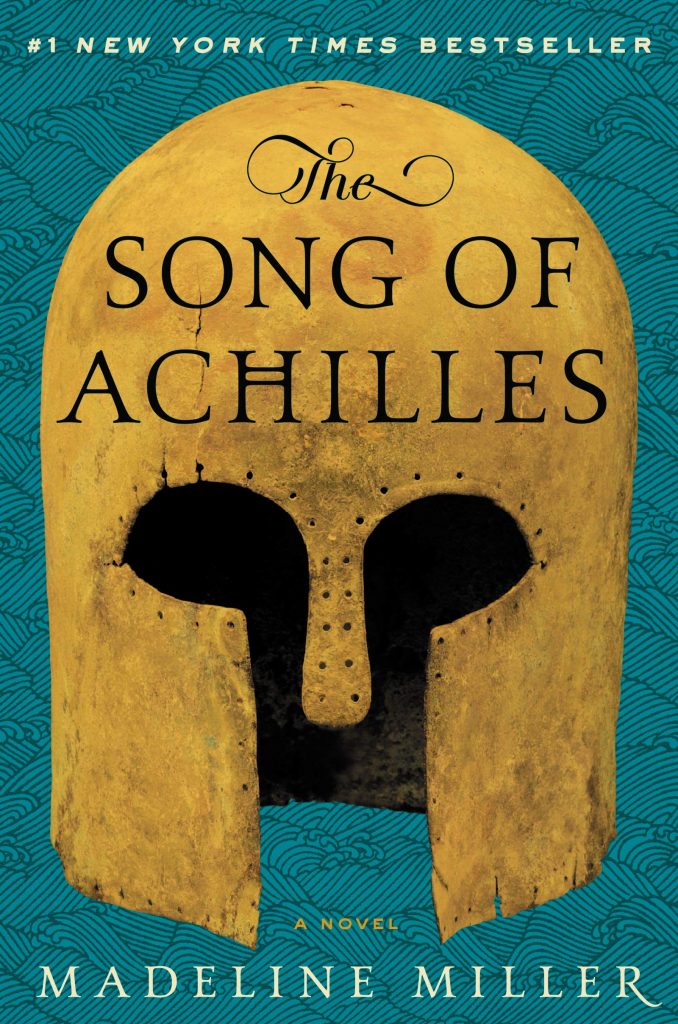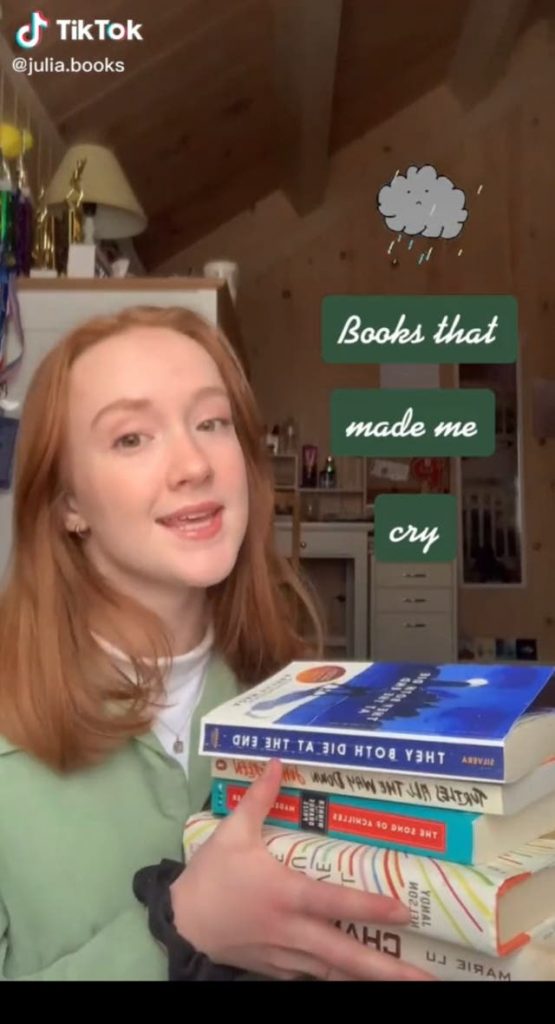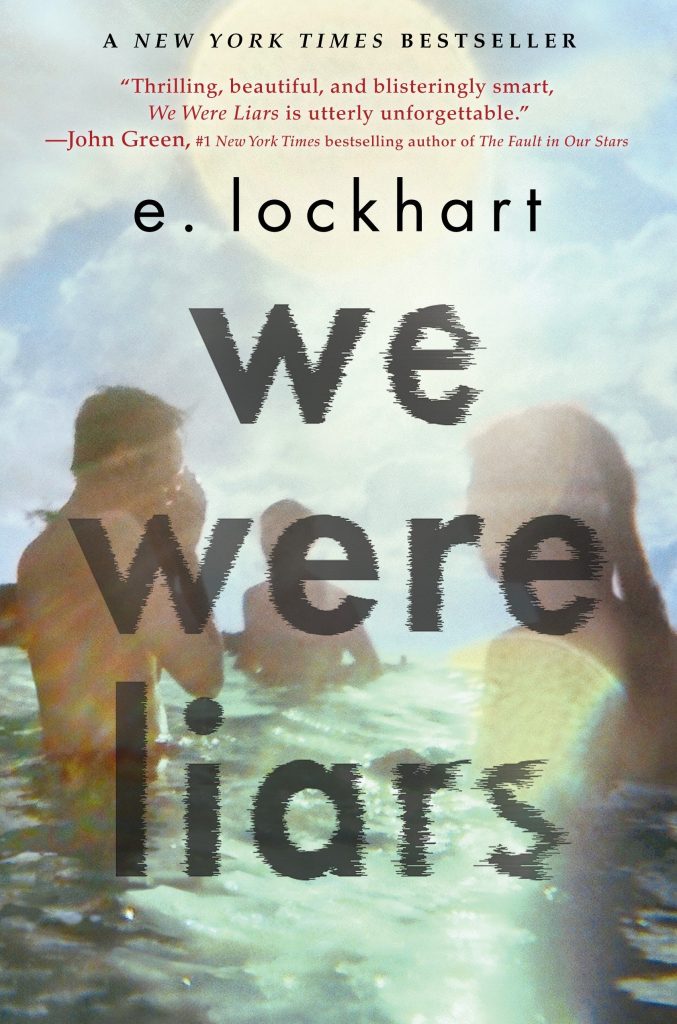Earlier this year I wrote about the hype machine and its influence on the book industry (and on our own subsequent reactions to the hyped books). In that post, I talked about how Instagram (“Bookstagram”), YouTube (“BookTube”), and Goodreads all contribute to the success of certain books. But, in my ignorance of the app, I neglected to pay tribute to the actual behemoth in the hype game: TikTok.
Confession: as an organization comprised mainly of adults, staff at the library are not as TikTok-literate as some of our younger patrons. A lot of us were scratching our heads as to why, for example, The Song of Achilles—a book published in 2011—currently has a combined total of 115 holds (and our neighbour to the south, the Toronto Public Library, boasts a total of 1911 holds). I mean, it’s a great book, but why the sudden burst in popularity? The story behind this is the same for titles like We Were Liars (2014), They Both Die at the End (2017), and One of Us is Lying (2017), which all have disproportionately long waitlists for how long they’ve been out. And the story is, to put it simply, that someone cried about them on TikTok.
Influence on book popularity often comes from outside the literary world. At the library, we know that if a book is adapted into a film or television show, the hold list will jump astronomically (if anyone is still interested in reading the first book of the Bridgerton series, it looks like it’s finally available). Same thing happens when a celebrity endorses a book, or if an author goes on TV to talk about their work (this is particularly true for health-related topics like dieting and aging). So it’s not surprising that social media would be a similar force. But where Instagram users pitch books via artfully arranged, hyper-controlled, aesthetically conscious images, and where YouTube creators talk about books for anywhere from 5-30 minutes, TikTokers create short, quick videos pivoting almost entirely on emotional reactions: “books that will make you sob” is a popular topic, and often features people wailing dramatically into the camera. In an interview with the New York Times on the topic, the director of books at Barnes & Noble shared the following tidbit: “These creators are unafraid to be open and emotional about the books that make them cry and sob or scream or become so angry they throw it across the room, and it becomes this very emotional 45-second video that people immediately connect with.”
So what kind of books, authors, and creators are we talking about? BookTok has been described as “a perfect mixture of dark academia and the Tumblr fanfiction scene”, so it probably comes as no surprise that BookTok is run primarily by female creators—and that their favourite books are mostly written by women or queer men. Skeptical by nature, I was prepared to disagree with whatever the teens were freaking out about online these days—but joke’s on me, because the popular BookTok reads are actually…pretty good? Humbling to see that plenty of my favourite recent reads have made the cut, that I’ve read many of the others, and that I have the same taste as teenagers!
Anyone passingly familiar with BookTok and Tumblr will notice the overlap, but I’m also seeing an overlap with the sort of videos YouTube keeps recommending me; aesthetically-curated playlists with intriguing titles like “you’re a young priestess falling in love with a greek god”, “playing the piano with your lover’s ghost in the abandoned cathedral”, and “pov: you’re a heartbroken mermaid” (these bizarrely specific mood playlists have become my work and writing soundtracks). Some of these videos recall BookTok directly, such as “He is half my soul, as the poets say”, which lifts a line from The Song of Achilles for its title.
The thread I’m seeing between these various platforms is the desire for escape. Late last year I wrote about the cottagecore phenomenon, and how it speaks to the overwhelming fatigue of living in a world that seems to be crumbling where we stand. I likened cottagecore to a renewed Romantic sensibility, and it’s not hard to see BookTok as a natural byproduct of that: the emphasis on emotion, dramatics, the rejection of modernity (aesthetically, anyway), especially as created by young people whose online experience has mostly been negative. BookTok has been described as “the Last Wholesome Place on the internet” (a claim I take issue with, as it is “lofi beats to chill/study to” community erasure), but what if we saw it as a desire for the return of niche, community-based internet? Is that too optimistic?
What’s particularly exciting about BookTok is how organic it is; most of the popular books (at this time, anyway) are not new, so they’re not just promoting the hot new thing. TikTokers are finding books that genuinely speak to them, mostly without recency bias. My concern is that publishers, now aware of the power of the platform, will start manipulating it as a selling tool, undermining what makes it resonate in the first place (some TikTokers have already been paid for their promo work). But we shall see.
Anyway, in the spirit of BookTok, here is a list of popular TikTok titles ranked in order of least to most likely to be thrown at the wall:
5. The Seven Husbands of Evelyn Hugo: This dishy story of an old-timey Hollywood star seems innocent enough, until you’re suddenly hit with feelings you didn’t ask for. Come for the gossip, stay for the heartbreak! Mostly an easy read, so not as upsetting as the others, but still. Very rude.
4. If We Were Villains: It’s no secret (hah) that The Secret History-esque books (think: pretentious college students, leafy campuses, murder) are my kryptonite, so I am high-key biased when I say this book is great. Even if you solve the murder mystery halfway through, like I did, the actual unfolding of events will have you reacting like the kombucha girl, ending on a final, “wait, WHAT?!”
3. We Were Liars: The story of an Old Money family and the tragedy that took place on their private Hamptons-like island one summer. This one reads like a Lana del Rey song playing on a warped record; off-kilter Americana. For a clue as to why one might toss the book out a window, the narrative takes a turn into Ian McEwan’s Atonement territory.
2. The Song of Achilles: If you know the story of Achilles, you know it doesn’t end well. Now imagine it as a romance, told by his lover Patroclus. I once got a text from my best friend, who had finished the novel on her lunch break, that read, “I was crying so much while reading it but then I had to get back to work so now I’m sitting at my computer trying so hard not to keep crying lmao” among a deluge of all-caps incoherence.
1. A Little Life: The content warnings for this book would be longer than this entire post. It is 700 pages of unrelenting emotional torture, while somehow still managing to be breathtakingly beautiful. It’s a book I both hated and adored, and I cannot recommend it in good conscience unless you are prepared to be nonfunctional for the next few days after finishing it. Be very warned!



I’m also older than what I think is the Tiktok crowd, so this explains a lot!
I love being rendered nonfunctional for days by a fictional story, so your warnings for A Little Life are actually selling it to me very well (as, I suppose, was intended!). Ditto for doomed love stories that actually end depressingly – though wasn’t the original Achilles & Patroclus story already a romance, really? Maybe it’s cathartic reading about fictional strangers’ tragedies? Also, I love your YouTube algorithm-recommended playlist titles.
We have the same taste, Karen. Also, in MY opinion the Achilles/Patroclus relationship was clearly romantic, although I guess not everyone agrees (for what it’s worth, Plato himself believed it was, and who are we to argue with Plato??).
True! Plato should know all about love and romance, having written the Symposium, so if he says it’s a romance, it most definitely is!
I used to have a Bookstagram account and I really loved the community, being able to connect online with other readers across the globe was fun! I agree, I definitely noticed the trend of escapism and reading fantasy books. It is not my preferred genre, but I am trying to explore it more now. When I was a teen, I did really enjoy the Hunger Games and the Giver in elementary school. These types of dystopian novels I really enjoyed, so I think it’s time I venture into the genre again.
That’s awesome! I honestly still love scrolling through bookstagram accounts. They’re so soothing and just lovely. I’ve always wanted to have one but it just seems like too much work to maintain! If you’re looking to get back into fantasy, you have soooooo many options to choose from! Happy reading 🙂